SA soccer clubs consider reverting to previously banned ‘ethnic’ names and badges after Football Federation Australia rule change
Eight SA soccer clubs will consider reverting to previously banned names or incorporating “ethnic” references in their badges and playing kits in a nod to their heritage after rules outlawing them were scrapped.
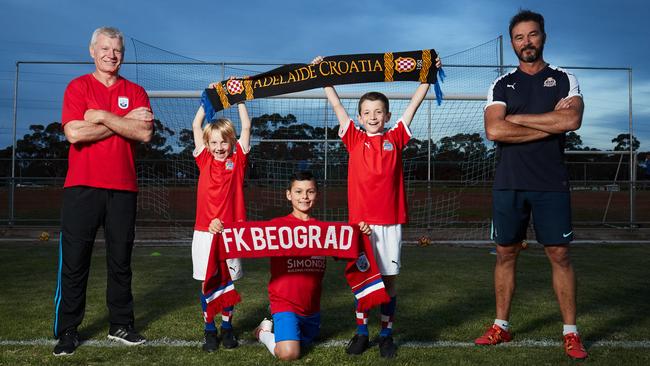
Local Soccer SA
Don't miss out on the headlines from Local Soccer SA. Followed categories will be added to My News.
- 90 Minutes: Comets coach opens up on exit
- Tricky FFA Cup test for West Adelaide
- Flores emulates Beckham’s wonder goal
- High-flying Olympic stays grounded
Eight SA soccer clubs will consider reverting to previously banned names or incorporating “ethnic” references in their badges and playing kits after rules outlawing them were scrapped.
Football Federation Australia announced earlier this month it would replace its National Club Identification Policy, which had governed team names and logos since 2014.
The changes would also overturn sanctions enforced by governing bodies more than two decades ago, described as “discriminatory” and “hypocritical” by the clubs they controlled.
Former National Soccer League champion West Adelaide had long campaigned for the NCIP to be abolished to allow the sport to celebrate its historical origins and cultural diversity.
Chairman Alex Alexandrou said FFA’s overdue rethink, which followed a national survey last year, would help clubs reconnect with disenfranchised supporters and communities.
“We thought it was unjust, unfair and discriminatory, especially in Australia which is a multicultural country,” said Alexandrou, of the NCIP.
“Above all, it’s disrespectful to the people who started these clubs and people like myself who are born in Australia and are Australian, but will never forget our heritage.
“In the ’90s after there were troubles in Europe, there was an escalation (of tensions) between clubs.
“But it’s a long way down the track now and we’ve all matured, so these changes are welcomed by everyone.”
West was forced to drop Hellas, a nod to its establishment by Greek migrants, from its name when “symbols of European nationalism” were banned from the NSL in 1991.
State league clubs followed suit a year later, after the SA Soccer Federation adopted a similar policy for team names and logos.
The NCIP formalised the controls nationally, outlawing “ethnic, national, political, racial or religious connotations” in a move, FFA claimed, would make the sport more inclusive.
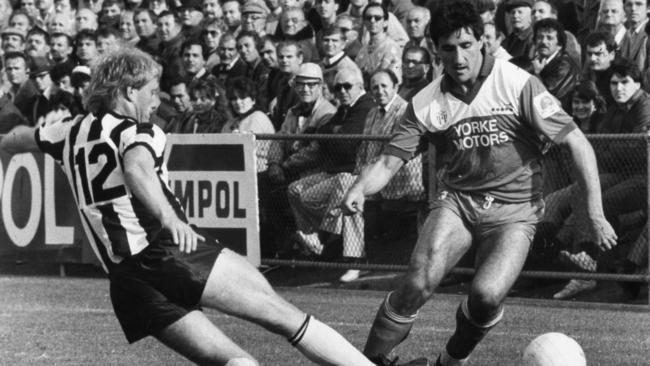
Alexandrou said West hoped to use Hellas on club merchandise and as its nickname in the National Premier Leagues SA.
Traditional rivals Raiders, formerly Adelaide Croatia, and White City, previously Beograd Woodville, also anticipated members would vote in favour of reverting to past monikers.
“It’s all about our heritage,” said Branko Suica, chairman of Gepps Cross-based Raiders.
“We did lose quite a few of the old school supporters back in the day from the change of name.
“It was forced on us, so there was a lot of bitterness surrounding it. This is a way to get some of them back.”
Post-World War II arrivals from Serbia founded Beograd in 1949.
Chairman Andrew Popovich said bringing back the original name and badge would celebrate the Woodville West club’s diversity and unite members from all cultural backgrounds.
“It (the NCIP) is hypocritical,” Popovich said.
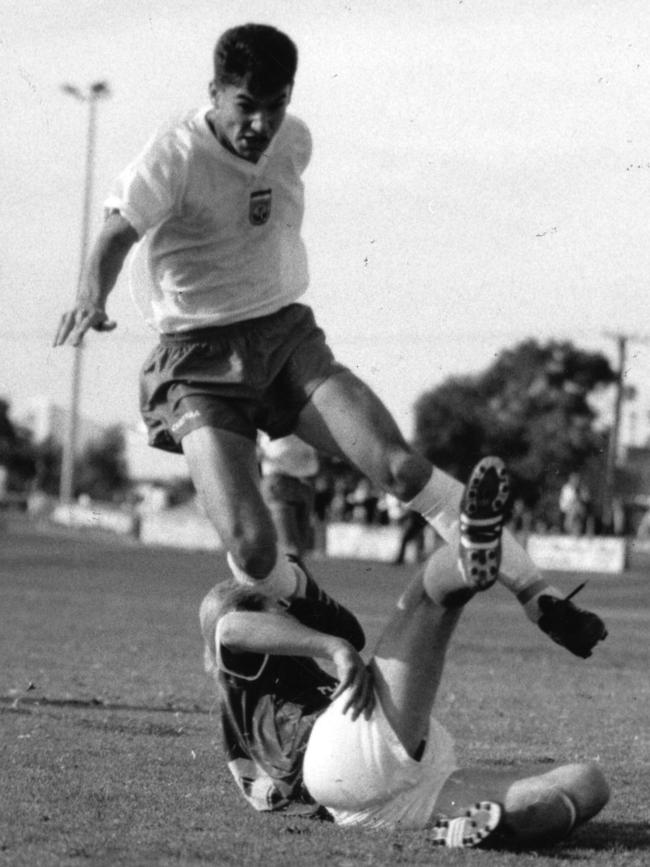
“As a country, we encourage multiculturalism and the very sport that promoted that multiculturalism has prevented it.
“Soccer has lost a lot of supporters because you can’t take away peoples’ identities.
“But the beauty of sport is it’s designed to bring people together and changing this (NCIP) would do that.”
The policy was widely questioned last season when Victorian club Avondale was forced to cover a small Italian flag on the back its shirt with duct-tape before an FFA Cup game.
Ex-NSL powerhouse Melbourne Knights had threatened legal action four years earlier after it was barred from displaying Melbourne Croatia Soccer Club as its shirt-front sponsor.
Polish-formed Croydon Kings’ board would discuss reinstating its Polonia title, believing it might boost match-day crowds and sponsorship opportunities.
Third-tier sides Adelaide Cobras, once Cypriot-founded Omonia, and Port Pirie-based Northern Demons, formerly Italian-backed Virtus, planned to do likewise.
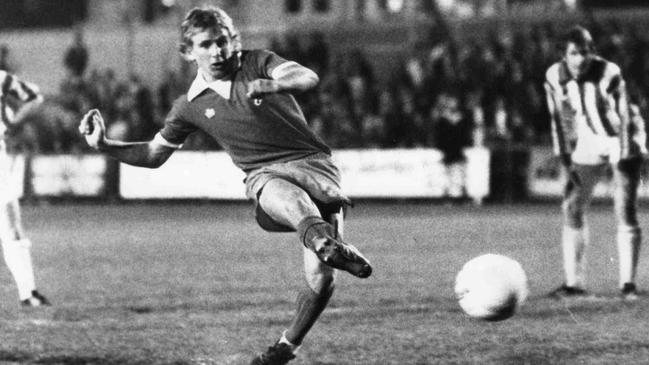
Ten-time SA champion Adelaide Blue Eagles were known as Eastern Districts Azzurri or Napoli for the first 35 years of their existence due to their Italian roots.
Secretary Paul Giordano hoped the Marden outfit, which had continued to trade as Azzurri Sports Club, would be permitted to display its previous names on its badge and playing shirt.
“It (the NCIP) was like an ethnic cleansing of clubs,” said Giordano, who also called for an annual league-wide cultural round.
“But every club should look back proudly at its history of where it colours come from and where its identity comes from.
“The changes are positive not just for historic clubs, but new clubs that come in as well.
“Football is the world game, so we should recognise it as such.”
Adelaide Olympic backed the NCIP overhaul and planned to feature a reference to its original Greek-themed name, Asteras, on its kit.
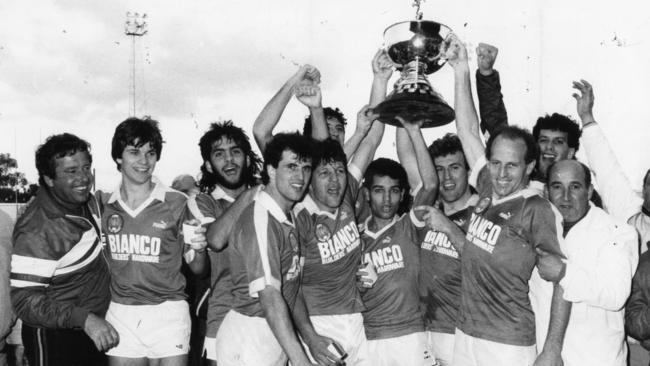
Three-time NSL winner Adelaide City also supported the move, but would not to revert to the Juventus identity it left behind in 1977.
Adelaide Comets, founded as Raiders, Sturt Lions, linked to former Dutch-backed side Orange Sturt, and Campbelltown City, established by Italian migrants, had similar views.
FFA chief executive David Gallop said the new policy would acknowledge the “contribution many communities across Australia have made to their clubs, whilst still promoting inclusion and diversity”.
An FFA spokesman said the guidelines would be released in the coming months.
Football Federation SA said it endorsed replacing the NCIP.
Rivals unite behind changes
ADRIAN Santrac and Peter Blazincic recall the fierce on-field rivalry when Beograd Woodville and Adelaide Croatia faced off.
But the state soccer greats were united in supporting the traditional powerhouses, these days known as White City and Raiders, returning to their historic identities.
The long-time foes were among eight SA clubs hoping to reinstate their original names or badges as Football Federation Australia scrapped rules outlawing “ethnic” references.
Santrac, top flight player-of-year with Serbian-founded Beograd in 1981, welcomed the governing body’s plans to abolish its National Club Identification Policy.
“We’re a multicultural country and that multiculturalism has grown and changed over the years,” Santrac, now 60, said.
“Our history right through our country should reflect that, both through society and through sport.
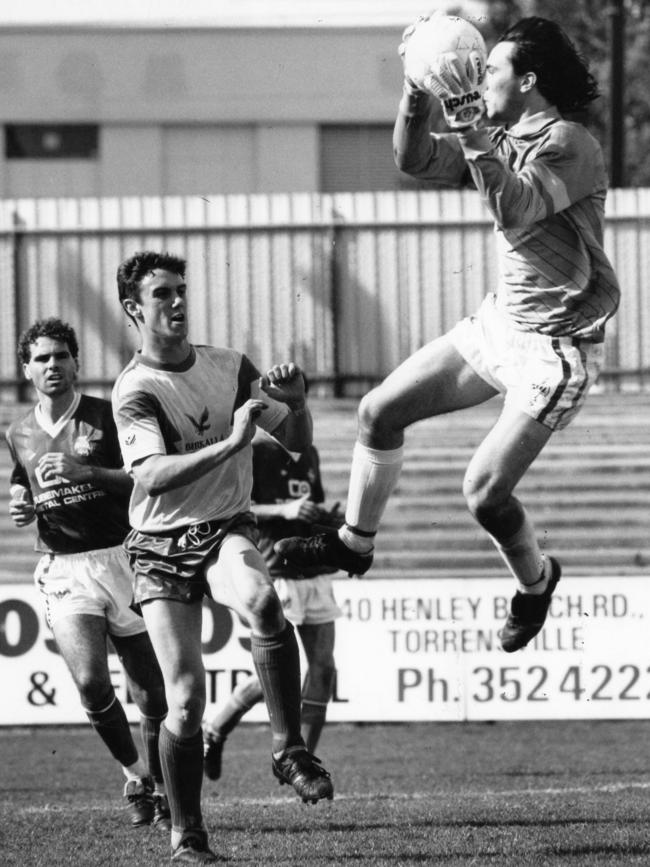
“Opening those doors again and recognising our clubs’ history is critical to the future of our game.
“There’s some great memories from those old times and the games we had against Raiders, our big rivals.
“You don’t forget those sorts of atmospheres and we shouldn’t walk away from that history or have it denied of us.”
Beograd junior Santrac said progressing through the club, backed by its passionate supporter base, had laid the foundation for his 169-game National Soccer League career.
Blazincic followed a similar path at Croatia, making his first-team debut aged 21 and going on become a teammate of Santrac’s at West Adelaide in 1991.
“It was a big deal playing in the local league at that time,” said goalkeeper Blazincic, who racked up 121 NSL matches.
“We used to get 3000 people at a derby (with Beograd) or a top-of-the-table clash.
“The clubs back then were much stronger having some sort of support from the (migrant) communities and players were a lot more loyal.
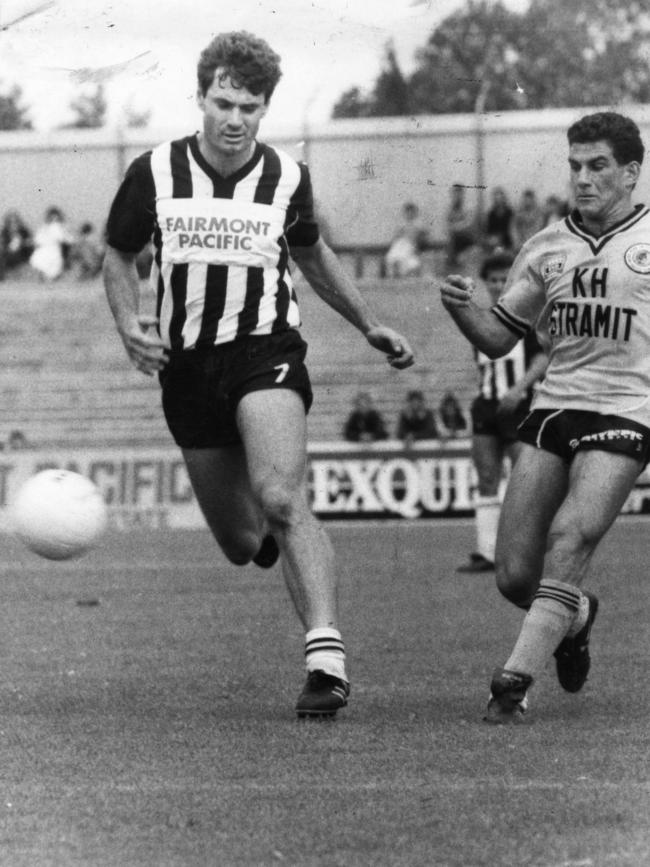
“Times have changed and people have assimilated more.
“But it (NCIP) needs to be changed and probably shouldn’t have happened initially.”
Ex-Adelaide United goalkeeper coach Blazincic said ties to his original club had drawn him back to Gepps Cross to pass on his knowledge to Raiders’ shot-stoppers.
Santrac said acknowledging the rich history of White City, which he coached from 2008-11, would celebrate its past while ensuring it remained inclusive of all cultures.
“Wherever you go in our society, the doors are open,” said Santrac, West Adelaide’s women’s mentor.
“It’s no different in these sporting networks and we’re trying to reach out to supporters from all backgrounds. Everybody is welcome to enjoy them.”



